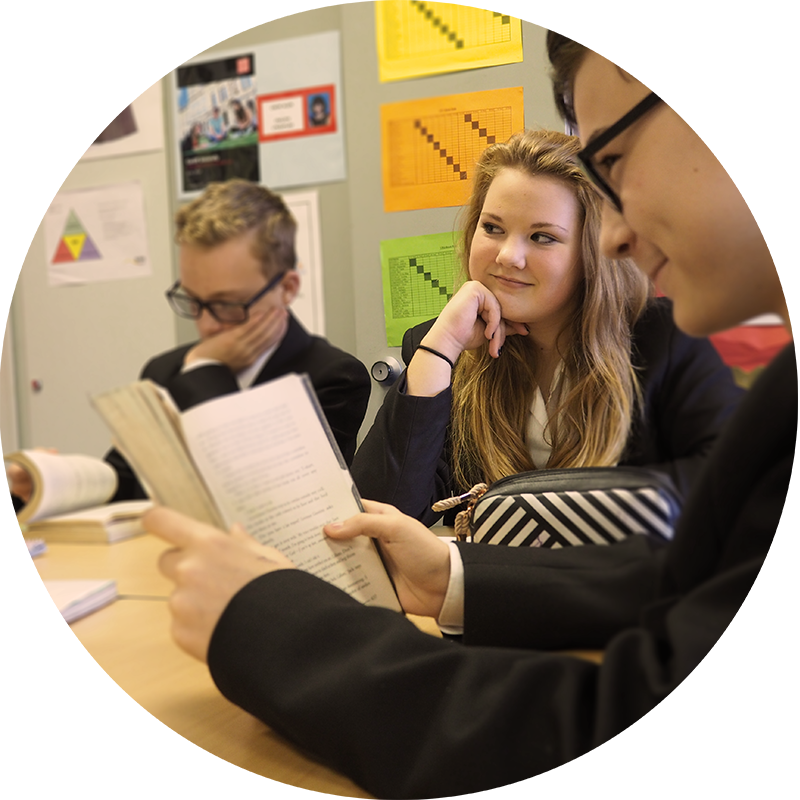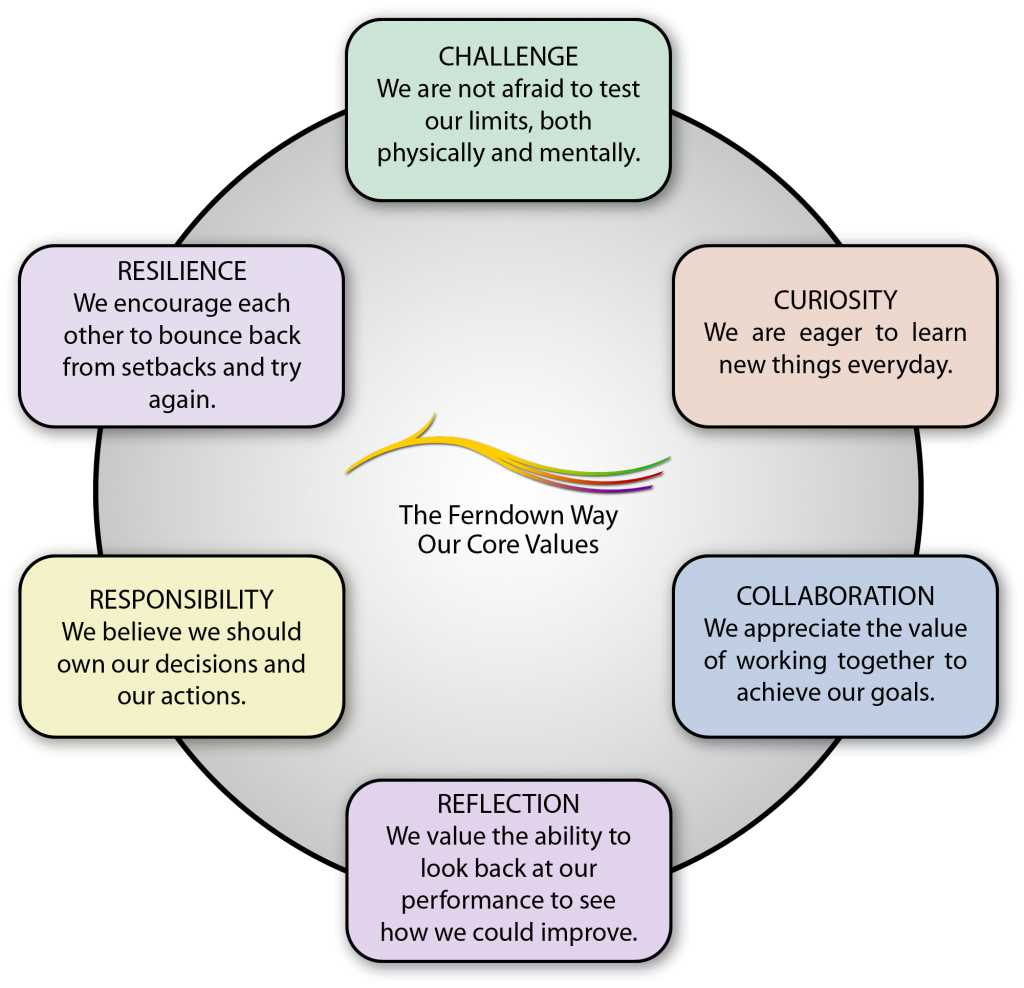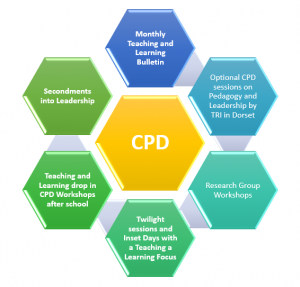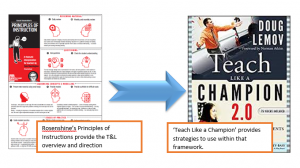The Ferndown Way
Though important, school is about more than exam success. The Ferndown Way underpins why our staff and students are so successful, whether it’s learning behaviours in lessons, how our students self-study or how our staff deliver engaging learning experiences:
The Ferndown Way is the ethos that drives consistency and high expectation across our school.
Our staff’s pedagogical and our students’ learning behaviours are also underpinned by our six core values: The 3Rs and 3Cs:
Resilience, Responsibility, Reflection, Challenge, Curiosity and Collaboration.
Threaded throughout the Ferndown Way, our core values ensure our students grow as whole individuals prepared for the world of work or further education beyond our school and Sixth Form.

Learn more...
Aims and Intentions
Our aims:
To ensure all teachers are experts in their subject area and plan time to develop subject knowledge.
To ensure that a 100% of teaching at the school impacts positively on our students’ outcomes with an ever increasing percentage of excellent learning experiences.
To deliver interesting,
knowledge-rich lessons that embed learning to ensure our students continue to deliver excellent outcomes.
To promote responsibility, resilience, reflection, challenge, curiosity and collaboration in lessons to develop our students into independent learners.
To provide many opportunities for our teachers to use research and pedagogy CPD to improve their own practice.
To use Rosenshine’s Principles of Instruction as a key tool in developing teaching and learning across the curriculum.
Across a series of lessons, our teachers:
1. Meet and greet students at the door.
2. Know the students’ learning needs; pace is rigorous and appropriate for the needs for all.
3. Use a seating plan for every class and every timetabled room.
4. Register the class within the first ten minutes of the lesson.
5. Start with a recap or low-stakes quiz.
6. Demonstrate secure subject and curriculum knowledge.
7. Direct teaching assistants and ensure the TA Agreement is being adhered to.
8. Move and stay on top of the class to insist on full participation at all times.
9. Use the school’s Behaviour Policy consistently; any low level behaviour is always challenged.
10. Use Rosenshine’s principles to provide recall opportunities, questioning, practice and modelling.
11. Promote literacy strategies in reading, writing and talk as set out in the subject’s curriculum plan.
12. Provide high-quality, clear feedback and time for students to complete DIRT activities in purple pen.
13. Include opportunities to deliver or discuss SMSC, careers and British values.
14. Ensure students’ books and folders are organised and presented to a high standard.
15. Organise classrooms to optimise learning and be inviting.
16. Set homework according to the staff homework timetable and ensure work is appropriate, beneficial and constructive practice or revision.
Behaviour the ‘Ferndown Way’
In lessons:
At Ferndown Upper School, we have very high expectations of you as a learner. We expect you to be a confident and
self-assured learner. You should have an excellent attitude to learning and be making good progress in
all your lessons. We expect you to be proud of your achievements and of your school. One key way you
can demonstrate this is in how you dress and act around the school site. You should always be smart,
on time and ready to learn (with equipment).
In lessons, you will discuss and debate issues in a considered way, showing respect for others’ ideas
and points of view. We expect you to understand that your education here is a step towards further
education, training or employment. We expect you to value your education and rarely miss a day at
school. We expect you to have impeccable conduct and to be self-disciplined. Your written work should
demonstrate pride as you aim for all your books to be ‘beautiful’.
Above all though we want to see the 3Cs and 3Rs in you as a learner each day:
- Curiosity – we expect you to take an active part in every lesson, asking questions and showing a
love of learning and having an enquiring mind. - Challenge – we expect you to always have a go at whatever is asked, demonstrating a love of
challenge. - Collaboration – we expect you to work well with anyone – be it teachers, teaching assistants or
other students or staff. We want you to actively listen to others at all times, showing good eye
contact and responding when necessary. - Responsibility – we expect you to be well equipped for each lesson, to take pride in all your work
and to have a positive impact on the learning of others. - Resilient – we look for Ferndown learners to have ‘bounce-ability’. This means you do not ever
give up, instead looking for another solution or another way. Use 3 before me in lessons. - Reflective – we expect you to respond well to feedback from your teacher. You should be able to
identify ways in which you can improve and above all value your education.
Outside of lessons:
We expect that you conduct yourself in a respectful manner at all times around the school site. This
means being polite and kind. You should treat others as you wish to be treated. We expect you to:
- Open doors for each other and particularly staff or visiting adults.
- Pick up litter.
- Respond immediately to any instruction from a member of staff.
- Never use abusive or hurtful language; you should be kind and courteous at all times – this is a
‘No Put Down’ school. - Keep yourself safe on-line by adhering to the school’s mobile phone and e-safety policies.
- Know where to get support if you need it.
- Report any incidents of bullying that you see or experience to a member of staff.
- Take the opportunity to engage with extra-curricular activities.
- Engage fully in and value the careers programme offered to you as part of your school journey.
Homework ‘The Ferndown Way’
Homework is a vital part of your preparation for exam success. In an exam you will be working alone.
The best practice of this is the work that you do at home, alone! You will be given several homework
tasks each night. This is because we want you to have lots of practice and be very successful. Research
shows that students who do their homework achieve, on average, two grades higher in all their
GCSEs compared to those who don’t do homework regularly.
We are aware that homework can cause some students to get stressed. There are a few simple things
you can do to avoid homework becoming stressful.
Six Top Tips:
1. Homework Club
Located in the Library (Room B8) 2.45pm-5pm Monday – Thursday and 2:45pm – 4pm on Fridays. There are computers, books and staff available
to help you with your homework.
2. Your tutor
If you are struggling with how to organise your work, speak to your tutor. They can help you
with your planner/phone calendar and help you organise which tasks need to be completed
when. This will help you avoid getting C3s for ‘Homework not handed in on time’.
3. School email
Every student and teacher has a school email. If you are stuck with your homework, email
your teacher and ask for some help.
4. Study group
Lots of students set up online study groups. This is a Facebook/Snapchat/Messenger service
that you use to discuss a homework task. Just remember copying each other’s work is not
allowed!
5. Speak to staff
If you are really stuck with a homework you can always go and see a teacher at break, lunch
or after school to ask for help. They really don’t mind. The most successful students are
often here until later in the day.
6. Use your parents
Your parents are a good source of help. They can make sure you have a quiet place to study
at home. They can help remove distractions (phone?). They can also help you with tasks if
you are stuck.
Beautiful Books the ‘Ferndown Way’
• Students are to present their work in books, A4 ring binder files or A4 lever arch
files. No wallet style folders.
• Students using files should include file dividers, staff to direct students to ensure
dividers are used appropriately.
• Work should be given an appropriate title per topic and labelled as classwork or
homework.
• Assessed work should be clearly visible in a separate assessment book/ file or in a
separate, and clearly labelled, divider in the file.
• There is no requirement to tick and flick work to acknowledge it’s existence.
• The measure that teachers have monitored students work will be through students
making progress or when questioned students can confirm the quality of verbal
feedback they have received.
• Peer marking should be used where appropriate as a means of feedback. Where
students have marked each others work, this should be clearly shown with the
markers name.
• When handouts are used these should be stuck in books rather than left loose.
Stuck sheets should not be folded.
• Books/ files should show student reflections including: ‘WHILT’ (what have I learnt
today)/WWW + EBI/’next time I will’.
• Key words/ subject terminology should be identified and defined.
• Teachers should set a minimum expectation of work in a lesson and students
should be monitored and challenged to ensure that this expectation is reached.



